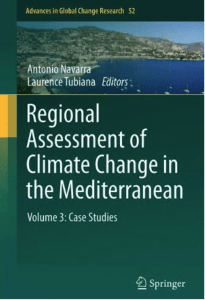Volume 3: Case Studies
Editors: Antonio Navarra, Laurence Tubiana
ISBN: 978-94-007-5768-4 (Print) 978-94-007-5769-1 (Online)
Series Title: Advances in Global Change Research
Series Volume: 52
Series ISSN: 1574-0919
DOI: 10.1007/978-94-007-5769-1
Publisher: Springer Netherlands
Volume 3 presents case studies performed in CIRCE, representing urban, rural and coastal environments and drawn from the north and the south of the Mediterranean shore.
Chapter 2: Agnew, M.D.; Goodess, C.M.; Hemming, D.; Giannakopoulos, C.; Bindi, M.; […]; Lionello , P […]; (2013) Stakeholders, in (A.Navarra and L.Tubiana eds), Regional Assessment of Climate Change in the Mediterranean, in Advances in Global Change Research 52, 23-37, Springer Netherlands, ISBN: 978-94-007-5768-4 (Print) 978-94-007-5769-1 (Online)
Abstract
The active participation of the stakeholder community is viewed as a crucial consideration in the regional assessment of climate change in the Mediterranean. Each of the CIRCE integrating case studies has benefitted from the real-life experience and expertise of local and regional stakeholders. The level of involvement has included stakeholder dialogue on an informal basis throughout the project, culminating in a series of more formal regional stakeholder workshops in the final year of the project. For each case study, stakeholders were chosen from the arena for which decisions are made at the regional-to-local level, and comprise local and regional decision and policy makers within government departments, agencies, and public/private sector entities. Regional stakeholders have contributed to the case-study assessments in six key areas: the conceptual framework and indicator selection, data and knowledge, identification of climate impact thresholds, risk assessment and management, strategies for adaptation, and guidance for policy. However, impediments to stakeholder participation have also been highlighted and include lack of motivation and resources commitment, stakeholder fatigue, and a need for targeted information. The CIRCE experience suggests that a more participatory approach, which involves sharing of ‘best’ practice and accessible targeted information, will be fundamental to successful adaptation planning in the Mediterranean region. This experience has also been used to develop a good practice checklist for facilitating stakeholder involvement in research projects.
CMCC Institutes
CMCC Divisions


